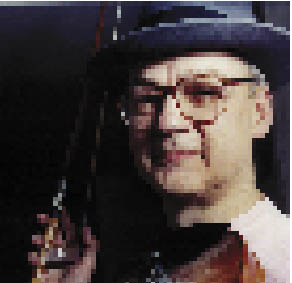Pioneer of the Minimal: Tony Conrad Retrospective
by Geoff Kelly

Forty years ago University at Buffalo Media Studies professor Tony Conrad created The Flicker, a keystone in the structural film movement; made with nothing but completely black and completely white images, the film’s strobe effect made some audience members physically ill. (“Maybe I would really blow people’s brains right out the back of their head,” Conrad told an interviewer many years later. “I didn’t know.”) Conrad went on to create many more films, to involve himself in a number of influential musical and performance collaborations—most notably with John Cale, Angus MacLise, Lamonte Young and Marian Zazeela, collectively known as the Dream Syndicate—and, of course, to teach, first at Antioch College and then here in Buffalo, where he has been a fixture and a catalyst in Buffalo’s active avant-garde art community. Over three evenings next week, Hallwalls presents Pioneer of the Minimal: Tony Conrad Retrospective, which samples the full canon of Conrad’s experimental music, film and video. Wednesday at 8pm, Conrad performs with an ensemble at Asbury Hall at the Church ($15/$10 for members). Thursday at 8pm, Hallwalls screens No Europe (1990), Beholden to Victory (1983), an excerpt from his cable access TV show Studio of the Streets and Coming Attractions (1970) ($7, $5 students/seniors/$4 members). Friday at 8pm Hallwalls, screens The Flicker (1966), Straight and Narrow (1970), Film Feedback (1972) and Cycles of 3s and 7s (1977) ($7, $5 students/seniors/$4 members). Friday’s screening will be followed by a conversation between Conrad and Columbia University’s Branden Joseph about Conrad’s work.
Wednesday- Friday, October 25-27 at Hallwalls Contemporary Art Center, 341 Delaware Avenue (854-1694) hallwalls.org.
|
Issue Navigation> Issue Index > v5n42: Arborgeddon (10/19/06) > See You There > Pioneer of the Minimal: Tony Conrad Retrospective This Week's Issue • Artvoice Daily • Artvoice TV • Events Calendar • Classifieds |









 Current Issue
Current Issue